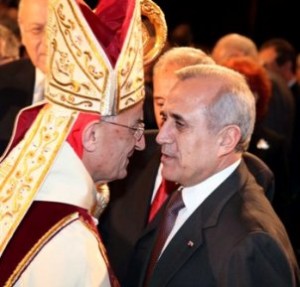
President Michel Suleiman met on Thursday with Maronite Patriarch Bechara Boutros al-Rai and said that the Patriarch “does not need anyone to defend him.”
“The patriarch does not need to be defended, and his stances represent his way of taking responsibility for Lebanon’s Christians,” Suleiman said in reference to Rai’s recent stances on the Syrian crisis
The president also said that Rai’s last week visit to France “was successful,” adding that “it benefits Lebanon.”
Rai came under fire last Friday from the opposition March 14 parties but won praise from March 8 politicians for indirectly defending Hezbollah’s arms and linking the party’s arsenal to the termination of Israeli occupation of Lebanese territory and the return of Palestinian refugees to their homeland . Even MP Walid Jumblatt who defected from March 14 alliance was very critical of Rai’s statements.
Last Thursday, Rai emphasized that only when the international community exerts pressure on Israel to vacate the occupied Lebanese territory ( the Shebaa Farms, Kfar Shouba hills and the Lebanese part of the disputed border village of Ghajar ) and Israel allows Palestinians in Lebanon to return to their homes, can Hezbollah be asked to hand over its arms because they will no longer be needed.”
He added that Syrian President Bashar al-Assad is “open-minded” and should be given more chances to implement the reforms he already announced.
Fares Soueid, coordinator of the March 14 Secretariat General, rejected Rai’s remarks on the divisive issue of Hezbollah :“Patriarch Rai’s statement is coming in contradiction with the principles of the Maronite Church which has since 1943 been supporting the project of state building,” He said adding
“The Maronite Church is condemning the presence of non-legitimate weapons in the hands of any of the communities in Lebanon, Christian or Muslim.”
The opposition March 14 parties, including former Prime Minister Saad Hariri’s Future Movement, have launched blistering campaigns against Hezbollah, calling on the party to hand over its arms to Lebanese authorities. They also accused Hezbollah of running its own mini-state at the expense of state authority.“The state, and not any other Lebanese party, is responsible for defending Lebanon. It is the state that takes charge of forcing Israel to leave Lebanese territory and not any Lebanese party,” Soueid said.
Jumblatt
“Linking the fate of Lebanon to the liberation of the Shebaa Farms and linking its future to all the region’s conflicts are rejected,” Jumblatt said in his weekly article in the PSP’s weekly newspaper Al-Anbaa
“Therefore, the [Lebanese-Syrian] borders must be demarcated. This demand had been unanimously approved at the National Dialogue [conference] in 2006,” Jumblatt said.
“While affirming the defensive significance represented by the resistance’s arms, it is essential to draw up a defensive plan through which [Hezbollah’s] arms are gradually accommodated in the framework of the Lebanese state as provided for by the [2008] Doha Accord in order to bolster the Lebanese state’s capability to confront any possible Israeli aggression,” Jumblatt said.
Pieton
Meanwhile, French Ambassador to Lebanon Dennis Pietton described Rai’s visit to France as “successful,” but expressed regret that the patriarch’s statements on Syria and Hezbollah’s arms had caused divisions among the Lebanese.
Speaking to reporters after meeting Prime Minister Najib Mikati at the Grand Serail last Tuesday , Pietton said Rai’s visit to France was “important” during which the patriarch met a number of French officials, including President Nicholas Sarkozy, to discuss Lebanese-French ties, the popular uprisings in the Arab world, including the situation Syria, the STL and the work of the United Nations Interim Force in Lebanon.
“But we regret that the patriarch’s visit had aroused this quantity of debate over his statements … We regret that this visit, which was successful and gave the patriarch a chance to express his opinion, had touched off this debate and divisions among the Lebanese in the Lebanese political arena,” Pietton said.

Leave a Reply
You must be logged in to post a comment.